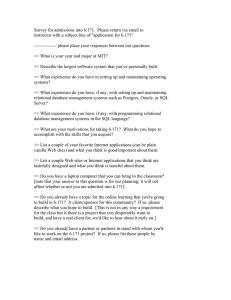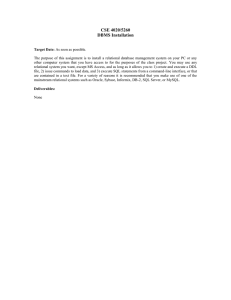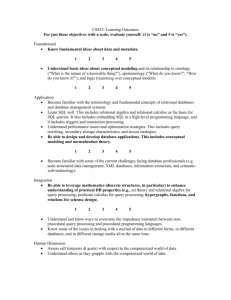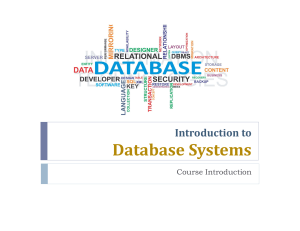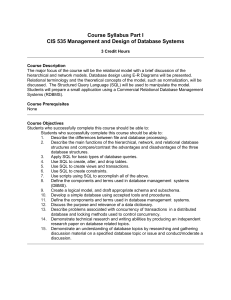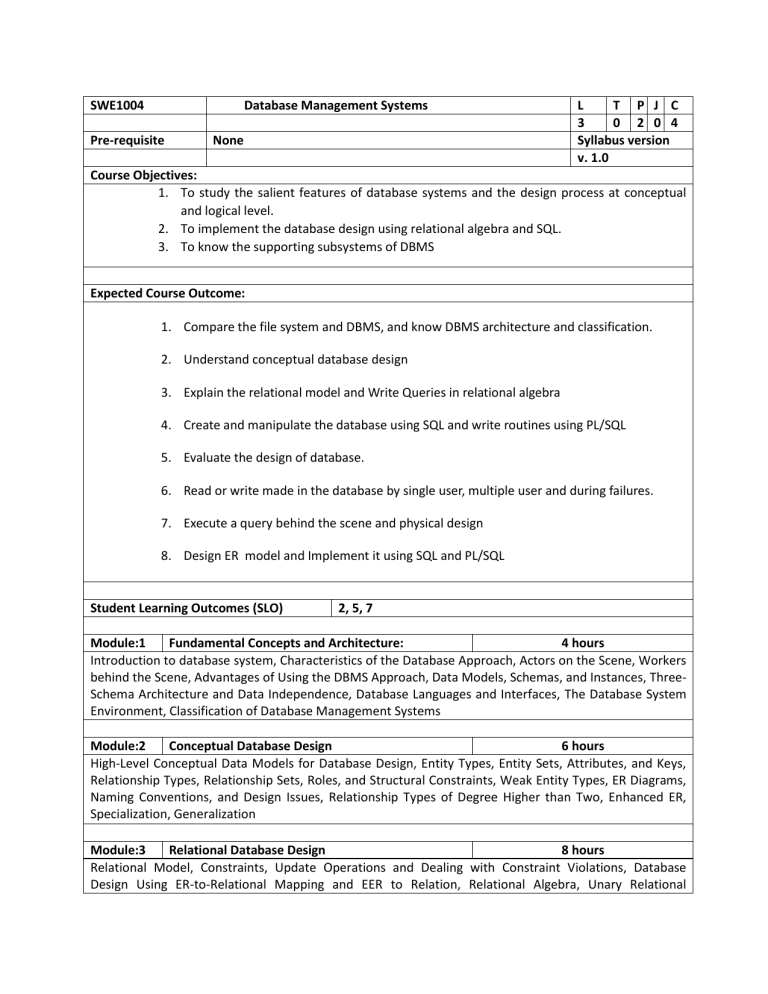
SWE1004 Database Management Systems Pre-requisite None L T P J C 3 0 2 0 4 Syllabus version v. 1.0 Course Objectives: 1. To study the salient features of database systems and the design process at conceptual and logical level. 2. To implement the database design using relational algebra and SQL. 3. To know the supporting subsystems of DBMS Expected Course Outcome: 1. Compare the file system and DBMS, and know DBMS architecture and classification. 2. Understand conceptual database design 3. Explain the relational model and Write Queries in relational algebra 4. Create and manipulate the database using SQL and write routines using PL/SQL 5. Evaluate the design of database. 6. Read or write made in the database by single user, multiple user and during failures. 7. Execute a query behind the scene and physical design 8. Design ER model and Implement it using SQL and PL/SQL Student Learning Outcomes (SLO) 2, 5, 7 Module:1 Fundamental Concepts and Architecture: 4 hours Introduction to database system, Characteristics of the Database Approach, Actors on the Scene, Workers behind the Scene, Advantages of Using the DBMS Approach, Data Models, Schemas, and Instances, ThreeSchema Architecture and Data Independence, Database Languages and Interfaces, The Database System Environment, Classification of Database Management Systems Module:2 Conceptual Database Design 6 hours High-Level Conceptual Data Models for Database Design, Entity Types, Entity Sets, Attributes, and Keys, Relationship Types, Relationship Sets, Roles, and Structural Constraints, Weak Entity Types, ER Diagrams, Naming Conventions, and Design Issues, Relationship Types of Degree Higher than Two, Enhanced ER, Specialization, Generalization Module:3 Relational Database Design 8 hours Relational Model, Constraints, Update Operations and Dealing with Constraint Violations, Database Design Using ER-to-Relational Mapping and EER to Relation, Relational Algebra, Unary Relational Operations, Operations from Set Theory, Binary Relational Operations, Additional Relational Operations Module:4 Structured Query Language 8 hours Data Definition and Data Types, Specifying Constraints in SQL, Basic Retrieval Queries in SQL, INSERT, DELETE, and UPDATE Statements in SQL, Virtual tables Inbuilt functions, Complex Queries-nested, correlated, PL/SQL block, cursor, function, procedure, trigger Module:5 Normalization Theory 5 hours Informal Design Guidelines for Relation Schemas, Functional Dependencies, Inference Rules, Equivalence, and Minimal Cover, Properties of Relational Decompositions, Algorithms for Relational Database Schema Design, Normal Forms Based on Primary Keys, Boyce-Codd Normal Form Module:6 Transaction, Concurrency, Recovery 6 hours Introduction to Transaction Processing, Desirable Properties of Transactions, Characterizing Schedules Based on Recoverability, Characterizing Schedules Based on Serializability, Concurrency, Two-Phase Locking Techniques for Concurrency Control, Concurrency Control Based on Timestamp Ordering, Multiversion Concurrency Control Techniques, Recovery Concepts, NO-UNDO/REDO Recovery Based on Deferred Update, Recovery Techniques Based on Immediate Update, Shadow Paging, ARIES Recovery Algorithm Module:7 Query Processing and Indexing: 6 hours Query Execution plan, Basic algorithms for query execution, Heuristic Query Optimization technique, sparse and dense index, primary, secondary and clustered index, B Tree Vs Hash Index. Module:8 Contemporary issues: Applications of Database Management Technologies in industry. Total Lecture hours: 2 hours 45 hours # Mode: Flipped Class Room, [Lecture to be videotaped], Slides, Demonstration of using OracleSQL, 2 hrs lectures by industry experts, Evaluation based on Continuous Assessment Test (30%) and Assignments(20%) Text Book(s) 1. Fundamentals of Database Systems by Ramez Elmasri and Shamkant B.Navathe Pearson Education,20 13 Reference Books 1. Database Management Systems by Raghu Rama Krishnan, Tata Mcgraw Hill,2010 2. Database System Concepts by Abraham Silberschatz, Henry F.Korth and S.Sudarshan, Tata Mc Graw Hill, 2011 3. Database System Design and Implementatio n by Rob Cornell,cennage learning , 2011 List of Challenging Experiments (Indicative) 1. SQL -Creating tables 2. SQL- Inserting, deleting, updating tables, Alter table 3. SQL -Querying table-simple queries 4. SQL- Creating constraints 5. SQL- Altering constraints 6 SQL- In built functions 7 SQL – Select statements(with different clauses) 8 SQL- Querying table-complex(nested, correlated) 9 SQL – Top N Queries ,catalog Queries, views 10 PLSQL- block, cursor 11 PLSSQL- trigger 12 PLSQL- Function, Procedure 13 SQL-Creating and Querying-type, varray, nested table 14 API- Creating API for retrieving data from database 15 API- Creating API for executing procedure/function Total Laboratory Hours Recommended by Board of Studies Approved by Academic Council SLO: 2, 5, 7 30 hours 12.06.2015 No. 37 Date 16.06.2015
